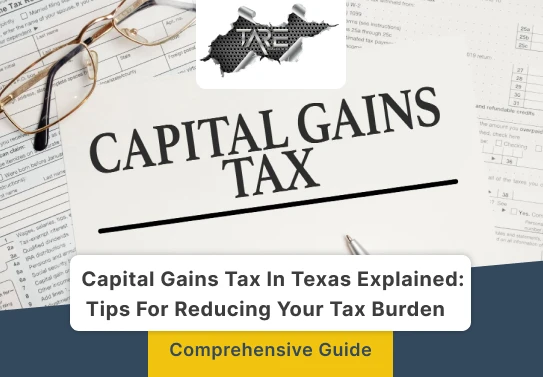Capital Gains Tax in Texas Explained: Tips for Reducing Your Tax Burden

Introduction
When considering an ownership transfer, particularly to a state like Texas, knowing the associated tax consequences is critical. Specific capital gains tax in Texas issues can influence your investment strategy when you are a shareholder. The state’s residents should be aware that regardless of whether the state does not impose a capital gains tax, they are still required to pay government taxes on the proceeds from the sale of resources such as shares and residential properties.
Capital gains fall into two main groups for tax reasons: short-term and long-term. While the second category includes products kept for more than a year, the former relates to earnings from sales made within a year. Continue reading this comprehensive article to learn more about capital gain tax and its implications on home sale.
Understand Capital Gains Tax Texas
The Texas capital gains tax is one tax structure that accounts for earnings from assets and other real estate. Since an indicated risk is associated with these kinds of operations, these capital gains are usually taxed separately from ordinary earnings, usually at a reduced rate. In contrast to most states that assess gains from investments similarly to average earnings, the state does not charge a special tax on this kind of profit. Making informed decisions on effectively handling risks can be improved by having an in-depth knowledge of these variations.
How Can I Determine If I Will Have to Pay Capital Gains Tax?
The kind of resource, the length of its ownership, and the amount of taxable earnings are some variables that will determine if you pay capital gains tax. Most resources, such as property, stocks, and enterprises, are liable to capital gains tax in Texas. You may choose your financial assets more wisely if you know which variables affect the amount of your capital gain taxable income.
For instance, the long-term rates, which are often lower than the short-term, apply to investments held for longer than one year. To reduce the burden of taxation, you may also delay the taxation of capital gains till the money is taken out by using tax-favored retirement plans like 401(k)s and individual retirement accounts.
Is There a Tax on Capital Gains in Texas?
Because the state does not impose a tax on earnings, its citizens are exempt from paying taxation on capital gains on their investments. However, all investment deals are subject to federal government taxes, just like they are elsewhere in the country.
Furthermore, citizens of states that do not impose capital gains taxes must submit tax returns to the Internal Revenue Service if they have purchased or traded shares, bonds, collective money, or taxes on selling a house in Texas throughout the year.
How to Reduce Capital Gains Tax in Texas?
You can take action to reduce your federal taxes on capital gains liability if Lone Star State does not have a state-level capital gains tax:
Exemptions and Relief from Capital Gains Tax
Consider taking advantage of the exclusions and limitations of this challenging tax. If the asset is kept for twelve months or more, singles or married people making less than $40,400 annually may be exempt from capital gains tax.
Putting Money into Retirement Accounts
Investing in programs that allow funds to accumulate tax-free value, such as 401(k)s and conventional Individual Retirement Accounts.
Purchasing Assets Subject to Exceptional Tax Classification
Antiques and particular kinds of residential property are examples of investments with unique tax statuses that may provide tax advantages.
Making Use of a 1031 Exchange
By utilizing the earnings of the transfer of an investment asset to buy a ‘like-kind’ real estate, you can use an exchange under 1031 to avoid paying taxation on capital gains on the transaction of the first home.
If you wish to efficiently handle capital gains tax in Texas and sell your home quickly, Tare Real Estate is a trustworthy option. They have a team of knowledgeable lawyers and real estate experts to assist you in legally reducing the Texas capital gains tax. Allow Tare Real Estate to handle the challenges of selling your home and help you with the capital gains tax procedure. Another option for a speedy sale is Tare Real Estate, a business well known for its successful house-selling services. You can contact them via phone, email, social media, or official website.
Bottom Line
Knowing capital gains tax in Texas will allow citizens and homeowners to sell their properties confidently and maximize their tax benefits. While there are no state-level taxes on capital gains, owners must pay federal taxes on their profits from selling belongings. The taxation rates on capital gains might be complicated to navigate, but with the correct knowledge and expert help, you can lower your responsibility, improve your tax plan, and save a lot of money on taxes. With the proper information and direction, you may safely handle your capital gains tax liability and reach your full economic capacity.
FAQs (Frequently Asked Questions)
If I sell my house in Texas, do I have to pay capital gains tax?
When selling your home for cash, you might be required to pay federal taxes on capital gains. However, various exclusions and techniques can minimize or avoid this specific type of income tax.
How can real estate capital gains tax be avoided?
A 1031 exchange, buffer zone investments, and charitable trusts are a few ways to lower the tax on capital gains on residential property.
Who can help me efficiently to avoid capital gains tax in Texas?
Tare Real Estate has a team of professional real estate experts and legal attorneys who can provide guidance to avoid capital gains tax.
Why should I choose Tare Real Estate to avoid capital gains tax?
Consulting Tare Real Estate will help you navigate the complexities of capital gains tax, saving you money and increasing your profits.